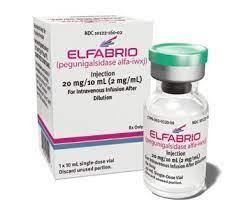Elfabrio Interactions
There are 6 drugs known to interact with Elfabrio (pegunigalsidase alfa), along with 1 disease interaction. Of the total drug interactions, 4 are major, and 2 are moderate.
- View Elfabrio disease interactions (1)
Medications known to interact with Elfabrio
Note: Showing generic names only.
Elfabrio disease interactions
There is 1 disease interaction with Elfabrio (pegunigalsidase alfa) which include:
More about Elfabrio (pegunigalsidase alfa)
- Elfabrio consumer information
- Compare alternatives
- Pricing & coupons
- Reviews (1)
- Drug images
- Side effects
- Dosage information
- During pregnancy
- FDA approval history
- Drug class: lysosomal enzymes
- Breastfeeding
- En español
Related treatment guides
Drug Interaction Classification
| Highly clinically significant. Avoid combinations; the risk of the interaction outweighs the benefit. | |
| Moderately clinically significant. Usually avoid combinations; use it only under special circumstances. | |
| Minimally clinically significant. Minimize risk; assess risk and consider an alternative drug, take steps to circumvent the interaction risk and/or institute a monitoring plan. | |
| No interaction information available. |
See also:
Further information
Always consult your healthcare provider to ensure the information displayed on this page applies to your personal circumstances.


